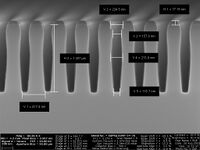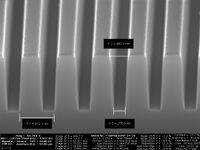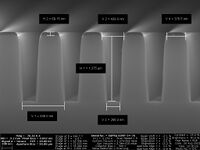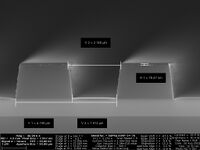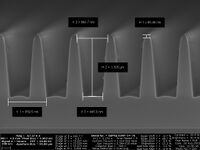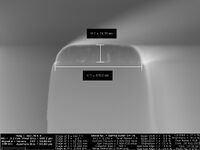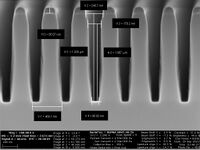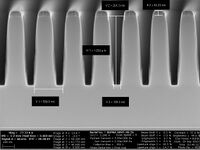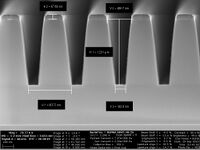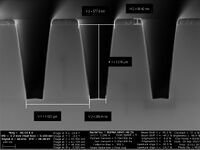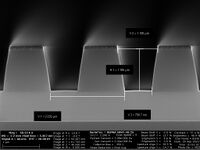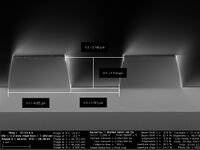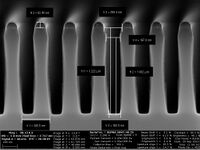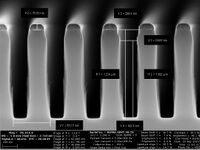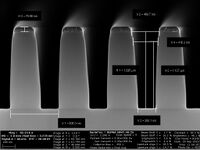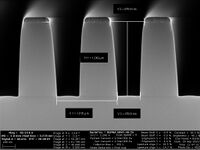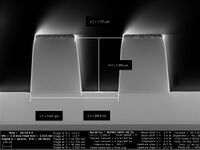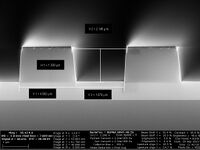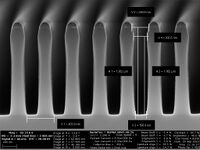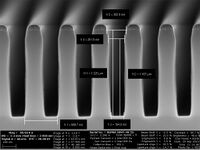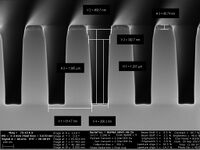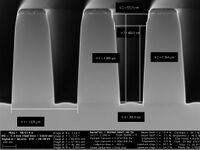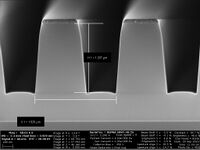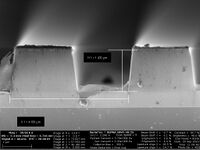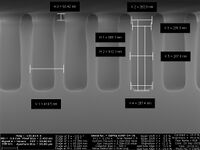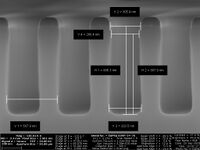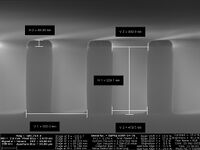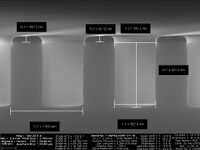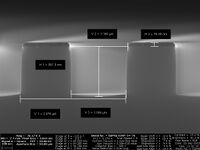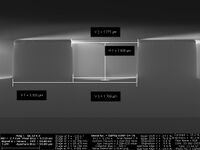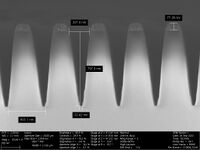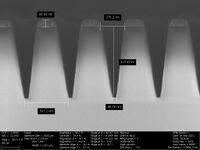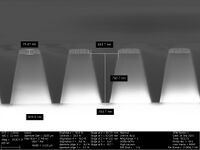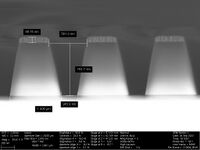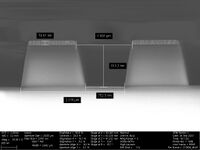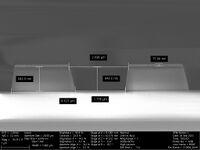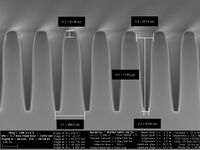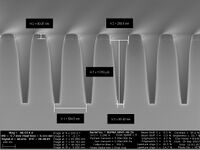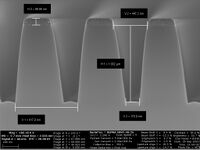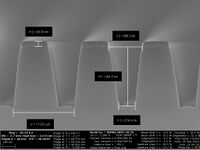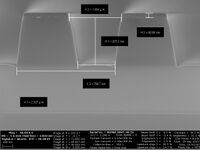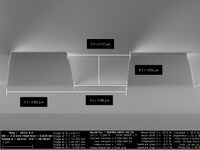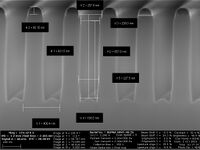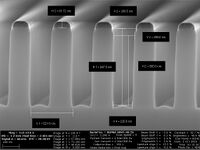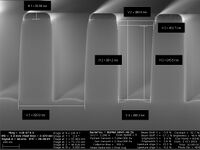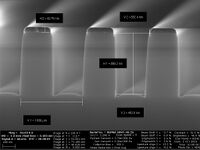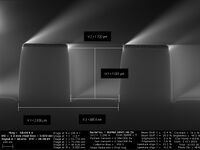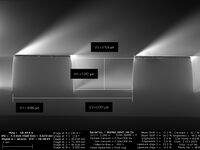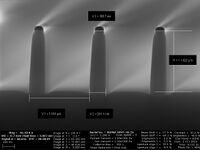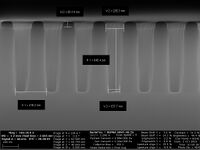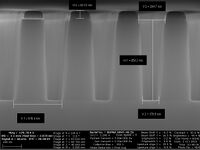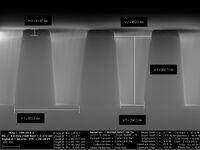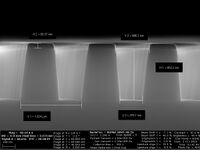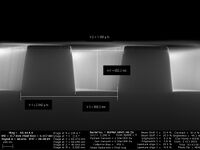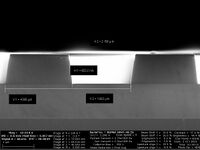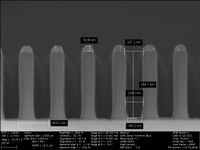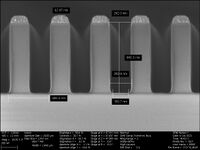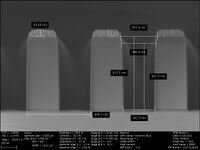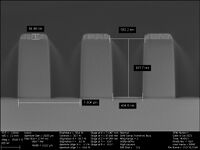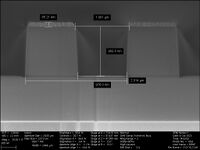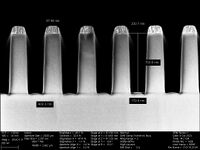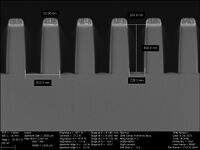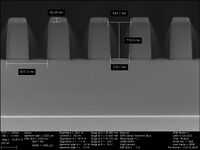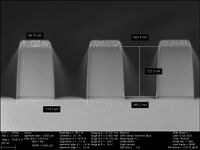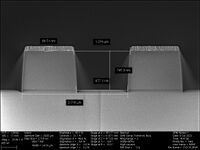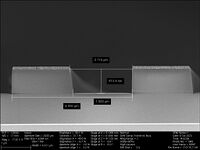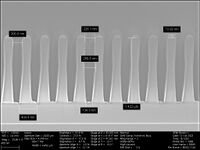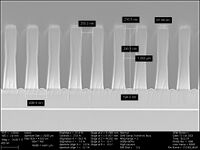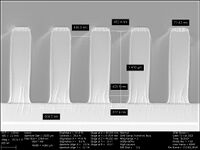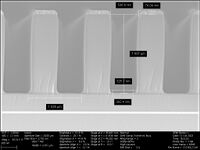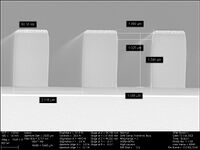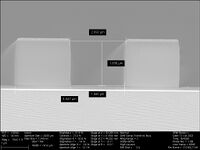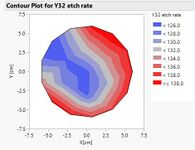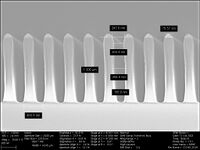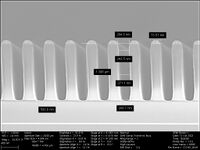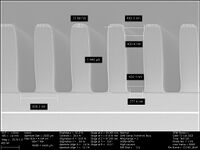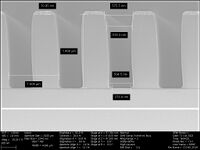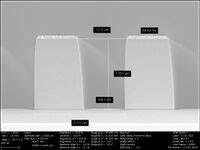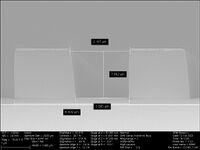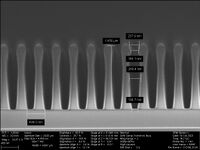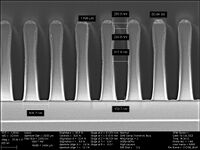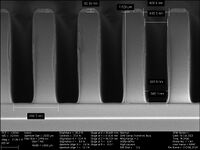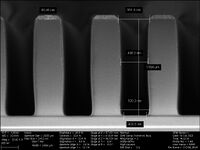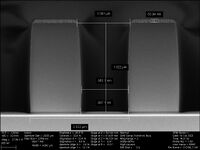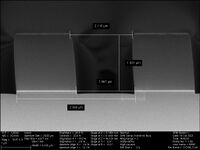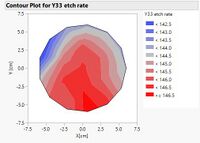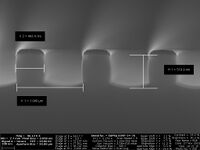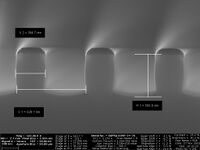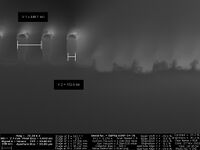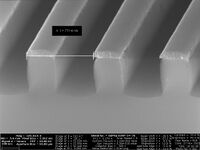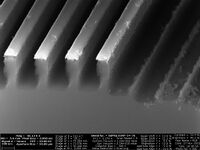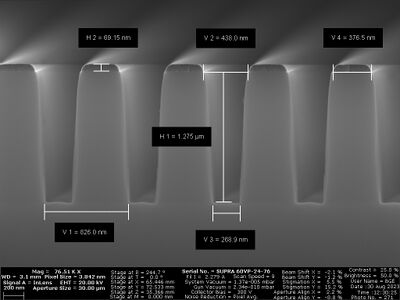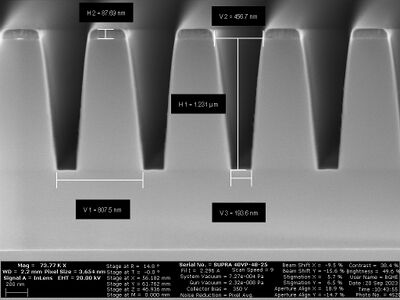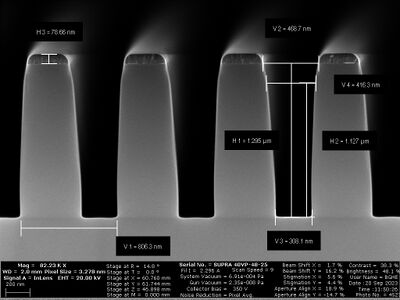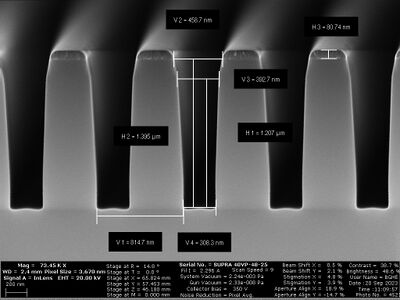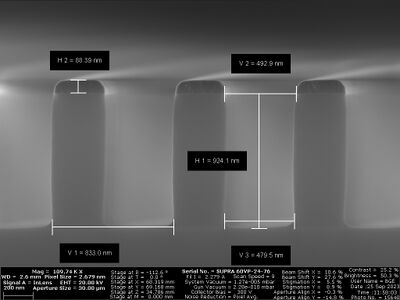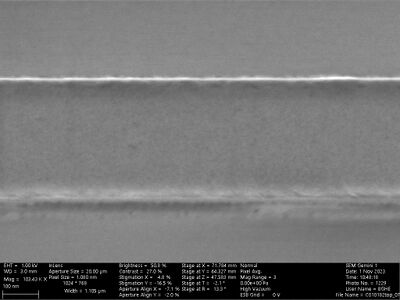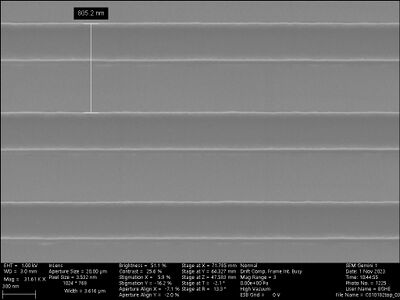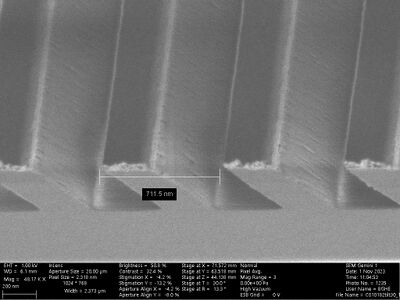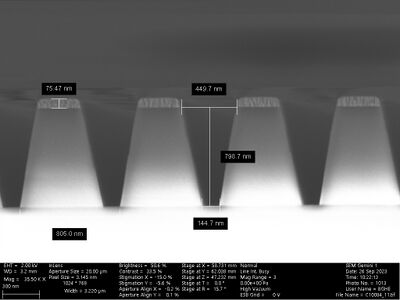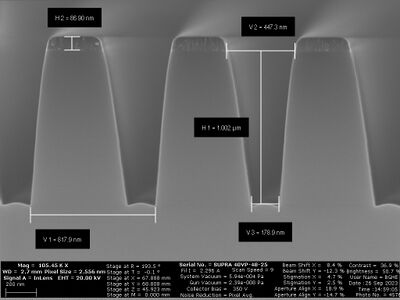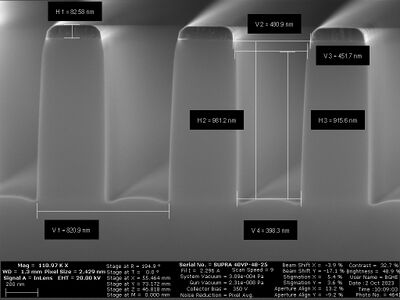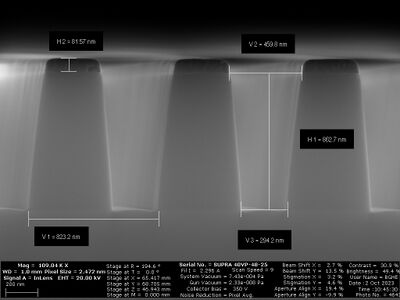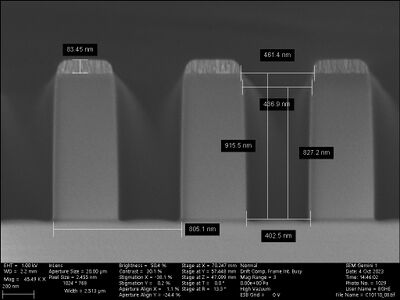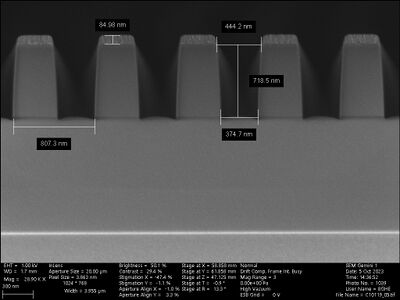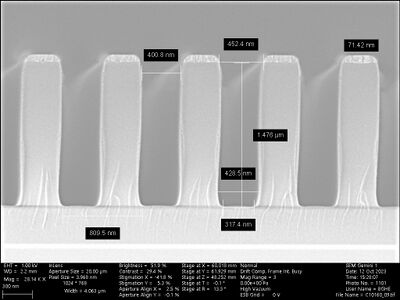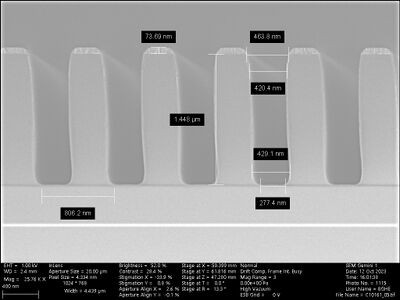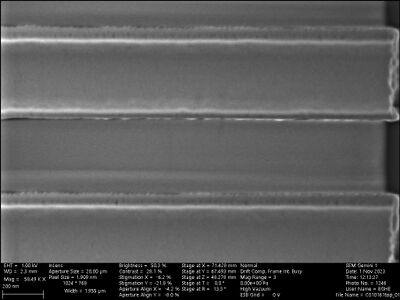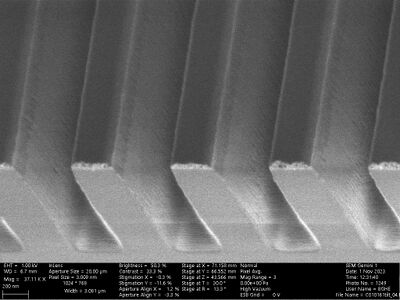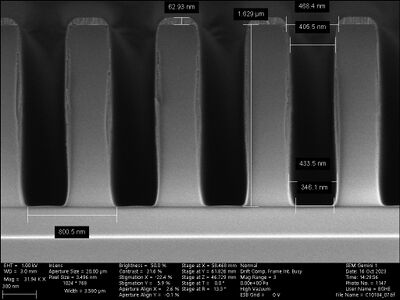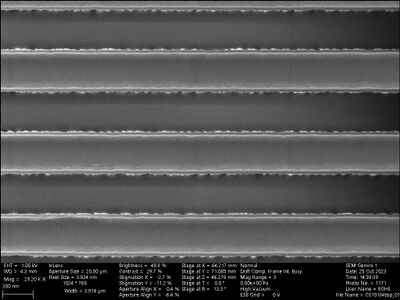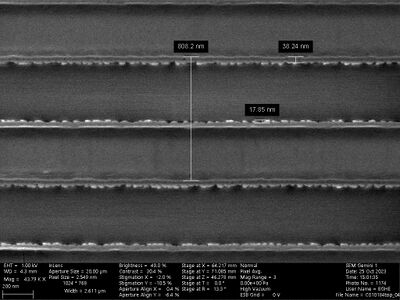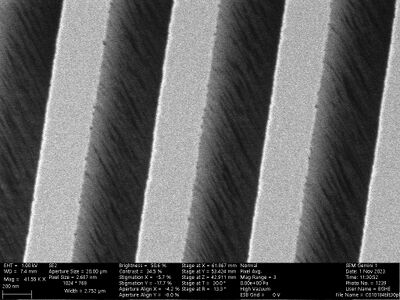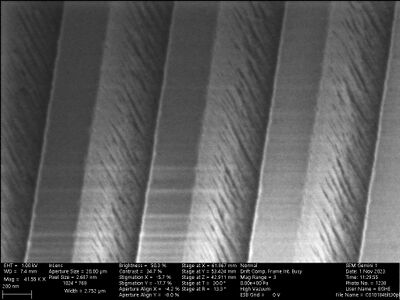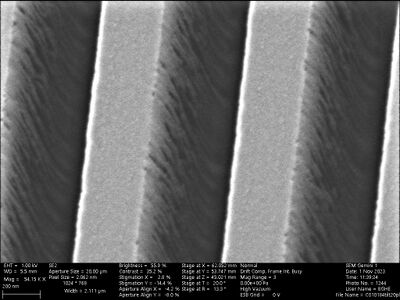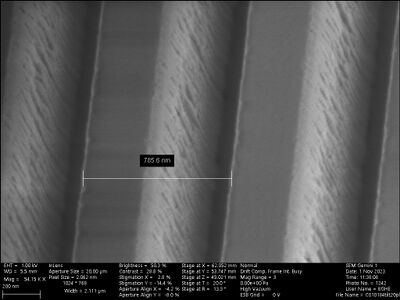Specific Process Knowledge/Etch/DRIE-Pegasus/Pegasus-4/SiO2 Etch/Cr mask
Appearance
Feedback to this page: click here
Unless otherwise stated, all content in this section was done by Berit Herstrøm, DTU Nanolab
SiO2 trench etching with Cr mask
| Start parameters, variations noted in the gallery headline | Recipe name: no 10 with lower platen power |
|---|---|
| Coil Power [W] | 2500 |
| Platen Power [W] | 200 |
| Platen temperature [oC] | 20 |
| H2 flow [sccm] | 25.6 |
| C4F8 flow [sccm] | 25.6 |
| He flow [sccm] | 448.7 |
| Pressure | Fully open APC valve (8-9 mTorr) |
| Electromagnetic coils (EM) 'outer coil' / 'inner coil' | '2 A' / '30 A' (PLEASE DO NOT RUN WITH THESE SETTINGS FOR MORE THAN 6 MIN) |
- 100 nm Cr mask etched in ICP metal with 500nm DUV neg resist (NUV 2300-0.5) and 65 nm barc.
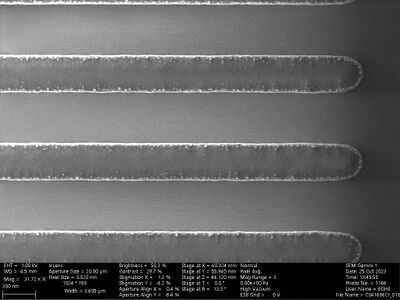
Results
| Temporary conclusions on how the process parameters affect the results in this study: | What process parameters affect the results? |
|
|
Profile SEM images
- SiO2 etch with Cr mask on full wafer 6 min etch
- SiO2 etch with Cr mask on wafer piece on Si carrier 6 min etch
- SiO2 etch with Cr mask on wafer piece on Si carrier 6 min etch, H2:0sccm
- SiO2 etch with Cr mask on wafer piece on Si carrier 6 min etch, H2:0sccm, O2:5sccm
- SiO2 etch with Cr mask on wafer piece on Si carrier 6 min etch, H2:0sccm, C4F8:13sccm He:225sccm, Pressure:3.35mTorr
- SiO2 etch with Cr mask on wafer piece on Si carrier 6 min etch, H2:0sccm, C4F8:13sccm He:225sccm, Pressure:3.35mTorr; platen power 150W, coil power:1200W
- SiO2 etch with Cr mask on wafer piece on Si carrier 6 min etch, H2:0sccm, C4F8:13sccm He:215sccm O2:10sccm, Pressure:3.6mTorr; platen power 150W, coil power:1200W
- SiO2 etch with Cr mask on wafer piece on Si carrier 6 min etch, H2:0sccm, C4F8:13sccm He:205sccm O2:20sccm, Pressure:3.6mTorr; platen power 150W, coil power:1200W
- SiO2 etch with Cr mask on wafer piece on Si carrier 6 min etch, H2:0sccm, C4F8:13sccm He:215sccm O2:10sccm, Pressure:3.6mTorr; platen power 150W, coil power:1800W
- SiO2 etch with Cr mask on wafer piece on Si carrier 6 min etch, H2:0sccm, C4F8:13sccm He:205sccm O2:20sccm, Pressure:3.6mTorr; platen power 150W, coil power:1800W
-
pitch 800 nm
Top 461 nm
@edge 437 nm
bottom 402 nm
height 916 nm
height from edge 827 nm
Cr left 83.5 nm
selectivity 55.5 -
156 nm/min
- SiO2 etch with Cr mask on wafer piece on Si carrier 6 min etch, H2:0sccm, C4F8:13sccm He:205sccm O2:20sccm, Pressure:3.6mTorr; platen power 100W, coil power:1200W
-
pitch 800 nm
Top 444 nm
bottom 374 nm
height 718 nm
Cr left 85 nm
selectivity 48
- SiO2 etch with Cr mask on wafer piece on Si carrier 14 min etch (PLEASE DO NOT REPEAT THIS LONG TIME), H2:0sccm, C4F8:13sccm He:205sccm O2:20sccm, Pressure:3.6mTorr; platen power 100W, coil power:1200W
-
Etch on none patterned wafer, Uniformity: +- 6.4%
- SiO2 etch with Cr mask on wafer piece on Si carrier 10 min etch, H2:0sccm, C4F8:13sccm He:205sccm O2:20sccm, Pressure:3.6mTorr; platen power 150W, coil power:1800W
- SiO2 etch with Cr mask on wafer piece on Si carrier 14 min etch, EM:0/0 H2:0sccm, C4F8:13sccm He:205sccm O2:20sccm, Pressure:3.9mTorr; platen power 100W, coil power:1200W
-
Etch on none patterned wafer, Uniformity: +-1.7%
- SiO2 etch with Cr mask on wafer piece on Si carrier 14 min etch, EM:0/0 H2:0sccm, C4F8:13sccm He:205sccm O2:20sccm, Pressure:3.9mTorr; platen power 100W, coil power:2500W
Profile, top view at tilted SEM images on 800 nm pitch and 50% duty cycle ( look at the Cr mask in top of the page
- SiO2 etch with Cr mask on full wafer 6 min etch
- SiO2 etch with Cr mask on wafer piece on Si carrier 6 min etch
- SiO2 etch with Cr mask on wafer piece on Si carrier 6 min etch, H2:0sccm
- SiO2 etch with Cr mask on wafer piece on Si carrier 6 min etch, H2:0sccm, O2:5sccm
- SiO2 etch with Cr mask on wafer piece on Si carrier 6 min etch, H2:0sccm, C4F8:13sccm He:225sccm, Pressure:3.35mTorr
- SiO2 etch with Cr mask on wafer piece on Si carrier 6 min etch, H2:0sccm, C4F8:13sccm He:225sccm, Pressure:3.35mTorr; platen power 150W, coil power:1200W
- SiO2 etch with Cr mask on wafer piece on Si carrier 6 min etch, H2:0sccm, C4F8:13sccm He:215sccm O2:10sccm, Pressure:3.6mTorr; platen power 150W, coil power:1200W
- SiO2 etch with Cr mask on wafer piece on Si carrier 6 min etch, H2:0sccm, C4F8:13sccm He:205sccm O2:20sccm, Pressure:3.6mTorr; platen power 150W, coil power:1200W
- SiO2 etch with Cr mask on wafer piece on Si carrier 6 min etch, H2:0sccm, C4F8:13sccm He:215sccm O2:10sccm, Pressure:3.6mTorr; platen power 150W, coil power:1800W
- SiO2 etch with Cr mask on wafer piece on Si carrier 6 min etch, H2:0sccm, C4F8:13sccm He:205sccm O2:20sccm, Pressure:3.6mTorr; platen power 150W, coil power:1800W
-
pitch 800 nm
Top 461 nm
@edge 437 nm
bottom 402 nm
height 916 nm
height from edge 827 nm
Cr left 83.5 nm
selectivity 55.5
- SiO2 etch with Cr mask on wafer piece on Si carrier 6 min etch, H2:0sccm, C4F8:13sccm He:205sccm O2:20sccm, Pressure:3.6mTorr; platen power 100W, coil power:1200W
-
pitch 800 nm
Top 444 nm
bottom 374 nm
height 718 nm
Cr left 85 nm
selectivity 48
- SiO2 etch with Cr mask on wafer piece on Si carrier 14 min etch (PLEASE DO NOT REPEAT THIS LONG TIME), H2:0sccm, C4F8:13sccm He:205sccm O2:20sccm, Pressure:3.6mTorr; platen power 100W, coil power:1200W
- SiO2 etch with Cr mask on wafer piece on Si carrier 10 min etch, H2:0sccm, C4F8:13sccm He:205sccm O2:20sccm, Pressure:3.6mTorr; platen power 150W, coil power:1800W
- SiO2 etch with Cr mask on wafer piece on Si carrier 14 min etch, EM:0/0 H2:0sccm, C4F8:13sccm He:205sccm O2:20sccm, Pressure:3.9mTorr; platen power 100W, coil power:1200W, the mask is removed by plasma ashing on top view and tilted view
-
tilt 30 degrees
-
tilt 30 degrees
-
tilt 20 degrees
-
tilt 20 degrees

